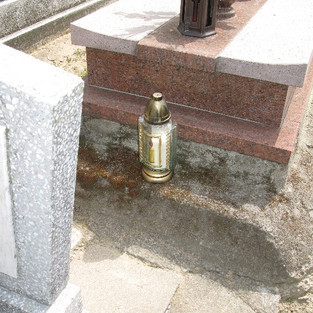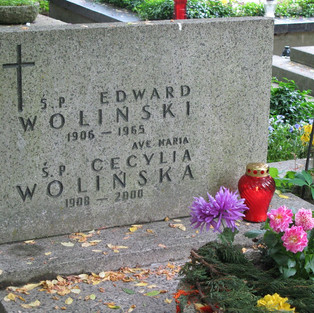Wieliniskigo - the family of Wielinski/Wolinski Gniezno, Poland
- Annie

- Oct 8, 2018
- 7 min read
Updated: Mar 26, 2019

The suffering of many Polish families during World War 2 is incalculable. They endured further suffering after the war with the invasion by the Russians. In every section of our family history we have met events that caused intolerable grief - murder of family members by the Germans, torture and cruelty, displacement and complete destruction of their homes and lives. Even in Gneizno, Poland miles from Warsaw the polish population suffered. No one could imagine the horror of having their homes taken off them, family members transported to slave labour camps, family members imprisoned in concentration camps. their homes destroyed, their sons and daughters murdered or their family members facing death by the mauling of German dogs.
Family Background
Wojciech Wolinski was born about 1871 to Valentinus Wielinski (1832 - 1862) and Marianna Kosminska in Poland and married at St Michael's, Gneizno, Poland in 1896 Elzbieta Catharina Ratuzna (1877 - 1955) the daughter of Franciszek Marcin Ratuszny (Born 1839) and Katarzyna Rustagan (1838 -1925). Wojciech and Elzbieta are my husbands maternal grandparents their daughter Stanislawa Wolinksi (1897 - 1934) had married Michal Born (c 1876 - 1844). ( See blog - 109 Panska)
Wojciech Wolinski (1871 - 1935) died in Poznan, Wielkopolskie, Poland on the 6th August 1935 prior to WW2. On the anniversary of his death there was a memorial in the St Lazarus Church notices of 2nd August, 1936. The name of Wolinski is spelt numerous ways in records and we have used the spelling as found on the records. Basically Wielinskigo means the family of Wielinski also spelt as Wolinski and Willinski as we go down through the records. Members of our section of the family moved to the town of Gneizno. Gniezno ([ˈɡɲeznɔ] German: Gnesen) is a city in central-western Poland, about 50 kilometres (31 miles) east of Poznan.. One of the Piast dynasty's chief cities, it was mentioned in 10th-century sources, possibly including the Dagome Index as the capital of Piast Poland. The Roman Catholic archbishop of Gneizno is the primate of Poland, making it the country's ecclesiastical capital. - Reference: https://en.wikipedia.org/wiki/Gniezno
Wojciech Wolinski (1861 - 1935) and Elzbieta Catharina Ratuszna (1877 - 1955) had the following children:
Ludwig Wolinski (1896 -1975)
Stanislawa Wolinska (1897 -1934)
Czeslawa Wolinska (1904 - 1992)
Edward Wolinski (1906 - 1965)
Sylvester Wolinski (1910 - 1942)
Roman Wolinski (1918 - 1940)

Ludwig Wolinski (1896 - 1975)
Ludwig was born in Gneizno, Poland in 1896 and died in Poznan in 1975 and he married Bogna Zielinski who died in 1989. Ludwig is buried in Junikowo Cemetery, Wielkopolskie. Ludwig was an engine driver in Poznan and he lived at Ulitca 1 Swieza, Poznan, Poland. His house was destroyed during the war by the Germans in an act of retribution for hiding his brother Sylvester Wolinski who was wanted by the Gestapo.

Stanislawa Wolinska (1897 - 1934)
Stanislawa was born in 1897 in Gneizno, Poland. She married Michal Born and lived at 109 Panska Street, Warsaw. She had a daughter Aleksandra Born in 1924 in Warsaw who migrated after release from slave labour in Germany to Australia on the "Fairsea" in 1950 and resided in Victoria until her death in 2005. At the time of her death she was residing at at 29 Hunter Street, Glen Waverley, Victoria, Australia. Stanislawa Born nee Wolinski died at 4 pm on the 28th October in Stanislawa Hospital, Warsaw, aged 37 years from septicaemia - her daughter was only ten years of age. Aleksandra was taken by the Germans in 1941 while out smuggling and sent to Unterluss, Germany where she was forced to work in a munitions factory owned by Rheins Metal Borsig. Michal Born disappeared in the Warsaw Uprising in 1944. Panska Street was levelled - totally destroyed in 1944.

Czeslawa Wolinska (1904 - 1992)
Czeslawa was born on the 30th June 1904 in Gneizno, Poland and she married Henryk Kucharski (1904 - 1953). Czeslawa died on the 19th June 1992 in Trcianka, Wielopolskie, Poland.
Czeslawa and Henryk had the following children:
Maria Kucharska (1935 - 2007) married Wiktor Malicki
Czeslaw Kucharski (1941 - 1997) married Maria Zachwyc
Janina Kucharski (1944 - 2007) married Edward Lagodzki
* Janusz Kucharski (Living) married Miroslawa Zofia Ostrowski
*Janusz Kucharski was the cousin that we managed to find through the International Tracing Organisation and the help of Ewa and Richard Turzynsky from Warsaw who were strangers and helped us find our family.

Janusz was the first member of her family that Aleksandra Lotocki nee Born had spoken to since 1941 - a total of 64 years. Janusz was able to provide a great deal of information about the family. The notes on this family were provided by Janusz.

Edward Wolinski (1906 - 1965)
Edward was born on the 12th October 1906 in Gneizno, Poland. he married twice - Julia, whose family owned a tannery in Gneizno, and Cecylia Polcyn, Prior to the war he was a teacher in Gneizno. Edward and Julia lived at Cierpigi 13 till 1939. - see photo below. From 1939 to 1945 the flat was occupied by Germans. Edward served in the army Reserves 69 Pulk Piechoty as a second Lieutenant P.K.U. Gniezno. Edward was the Headmaster of a boys school and lived in Gniezno, his wife Julia was the Headmistress of the girls school. Edward was taken away by the Germans to Auschwitz in 1939 and then to Oranienburg where he was eventually freed by the Americans. The Radom Prison 1939-1944 show him as prisoner Number 1031 (JewishGen) He went to Lubeck, Germany, where he founded a school for Polish children. He returned to Poland in 1947 and studied at the University of Poznan and completed a Masters of Philosophy in 1950.

He divorced from his wife Julia and married Cecylia Polcyn who was from Gniezno He then lived in Warsaw and died in 1965. He is buried in the Powanski Cemetery.
Cecylia died in 2001 and is also buried at Powaski Cemetery. There were no children from both marriages

Sylvester Wolinski (1910 - 1940)
Sylvester was born in Gneizno in 1910. He was the Headmaster, of a school for school for children in the village of Lulkowo and Jankowo near Gniezno. Sylvester being an academic decided to translate Hitler's "Mein Kampf" and write a contra ideology. This activity was noted by pro Nazi sympathisers prior to WW11. When the war began and the Germans reached Gniezno, the Nazis were informed of this and he was placed on the list of persons to be found and executed. The German Political Police began to search for Sylvester who with his wife went into hiding. As the search became more intense Sylvester fled Gniezno and lived with Ludwig, his brother, in Poznan. Ludwig was an engine driver and he hid his brother. Janina stayed in Gniezno. The Germans were patient and kept searching, knowing that the family in Gniezno would know of his whereabouts. Sylvester survived in hiding for nearly three years then as the search widened he was discovered in Poznan. He was imprisoned in a building called "Dom zolnierza" in Poznan, (Soldier's House), Ul. Mlynska, which is now a theatre. Here the Gestapo placed him in a cell and then set their dogs onto him. He died from the mauling, 1942. His wife Janina was taken from Gniezno at the time of his capture, she was being used as a bait for his return, and sent to Auschwitz where she died in 1943.
"Under occupation, Poznań’s Imperial Castle was remodelled as a residence for Nazi Governor Arthur Greiser by infamous Reich architect Albert Speer, though Greiser spent most of the war residing at ul. Berwińskiego 5. Gestapo HQ was located in DomŻołnierza (ul. Niezłomnych 1), which became an interrogation centre with thousands of Poles tortured in the basement. It was stormed by the Red Army in February 1945 and fiercely defended by the SS, who ultimately opted for mass suicide over capture. Completely battered by this siege, the only original remnant of the building is its tower, spared the brunt of Soviet aggression so it could be used as a reference point by artillery units."
www.inyourpocket.com/poznan/World-War-II-Poznan_73324f
Roman Wolinski (1918 - 1940)
Roman was born in 1918 in Gneizno, Poland and he died Christmas Eve 1940 in Gneizno, Poland - aged 22 years. He worked in commerce and trade.He finished school as a salesman/ buyer and worked in warehousing. For a short time he worked in a German Magazine (warehouse), food store. At Xmas time trucks were carrying large casks of wine. A truck was rounding a corner when it tipped and lost its load as the casks were not tied down. The casks rolled onto Roman and crushed him.
Elzbieta Wolinska nee Ratuszna lived with her husband Wojciech Wolinski behind the Bishops Palace in the Bishops Garden in Gneizno, Poland. It was here as a child that Aleksandra Lotocki nee Born spent many happy holidays with her grandmother. The Wolinski's are registered also at Johanis Strasse 6, Gneizno, Poland. Elzbieta was born on the 19th February 1877 at Gneizno, Wielkopolska, Poland at noon - her baptismal name was Anastasia She was baptised on the 27th February 1877 in Gneizno and the witnesses at baptism were Tomasz Panowicz and Agnieszka Golczynska. She married Wojciech in 1896 in St Michaels, Gneizno. Her mother, Katarzyna Ratuszna nee Rustagan died on the 12th November 1925 at Trzemeszenska 80, Gneizno, Poland. Elzbieta was living with her son Roman at Cierpegi 13 and then with them after the war near the school (at 6 Wigury Gneizno) in a flat at 16 Wigury Street.

Elzbieta died on the 29th March 1955 at Z. Wigury Street at 13.15 hours and received the last sacraments. She was buried in Grave 129/55 at St Michala Cemetery - Sw Krsysa, Gneizno. She was 78 years of age.
Photos: Elzbieta Wolinksi's grave; Krsysa Cemetery - looking from the grave; Wal Lotocki, Maria and Janusz Kucharski in 2008; Ratuszny cousins that helped us in Gneizno, Poland; Grave of Edward and Cecylia Wolinski in Powanski Cemetery, Warsaw; Powanski Cemetery; Bogna Wolinski and Elzbieta Wolinski in 1954; Cecylia Wolinski and Edward Wolinski on their wedding day; Dr Eugeniusz Wolinski and his son; Julia and Edward Wolinski; Julia, Edward, Wojciech and Ludwig Wolinski in 1931; Michal Born and Stanislawa Born nee Wolinska with unknown; Ratuszny Family from Gneizno.


































Comments